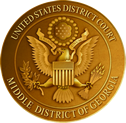

The purpose of this page of the guide is to provide general information on the judicial branch of Georgia and where those primary sources can be found. A flowchart of the state's court system highlights how cases are presented to its designated court.
This page is also intended to illustrate the political affiliation of judges within the state and federal court systems and to dispel myths and disinformation that the courts were politically stacked against ruling in favor of Donald Trump. I provided links to the laws of Georgia state for the election of judges to also highlight their history and ruling records. I also linked the cases that courts adjudicated related to the 2020 election. For the full list of election litigation, see the 'Lawsuit Verdicts' page. In addition, see my 'Disclaimer Note' for additional reasonings and thought processes on how political affiliation was determined.
Lastly, only the judges related to lawsuits of the 2020 election are displayed. Georgia has over 200 district court judges and would serve no purpose to look at all of the political affiliations when the scope of this research is the 2020 Presidental Election.
| Supreme Court | Court of Appeals | Superior Court | Probate Court | State Court |
|---|---|---|---|---|
| Nonpartisan election - six-year terms | Nonpartisan election - six-year terms | Nonpartisan election - Four-year terms | Partisan election of judges - Four-year terms | Nonpartisan election - Four-year terms |
Judges in Georgia are elected via nonpartisan elections. Judicial elections are held in Georgia in even-numbered years and take place on the primary date.[1]
Most court elections in Georgia are nonpartisan. Counties may choose to hold partisan elections for probate court positions. There are only judicial primaries for partisan elections.[1][2]
If no candidate receives a majority of the votes in the election (at least 50%+1 of the vote), a runoff election will be held between the two candidates with the most votes.[3]
If no candidate receives a majority of the votes in the election (at least 50%+1 of the vote), a runoff election will be held between the two candidates with the most votes.[3]
Federal courts have jurisdiction over cases involving:
For instance, a claim by an individual to receive money under a federal government program such as Social Security, a claim by the government that someone has violated federal laws, or a challenge to actions taken by a federal agency might all be heard in federal court.
In contrast, most family law matters are addressed in state court, since federal court jurisdiction granted by the U.S. Constitution does not include this area of law.
Few cases wind up in federal trial court, also called U.S. District Court. Judges encourage parties involved in a dispute to reach an agreement and avoid the expense and delay of a trial.
The impact of the federal courts on our lives is best known by landmark Supreme Court cases and other federal court cases that show the judicial branch is significant to the way we live and the rights we have.*
*From the About Federal Courts page
This section of uscourts.gov provides statistical data on the business of the Federal Judiciary. Specific publications address the work of the appellate, district, and bankruptcy courts; the probation and pretrial services systems; and other components of the U.S. courts.
The Federal Court System |
The State Court System |
|
Article III of the Constitution invests the judicial power of the United States in the federal court system. Article III, Section 1 specifically creates the U.S. Supreme Court and gives Congress the authority to create the lower federal courts. |
The Constitution and laws of each state establish the state courts. A court of last resort, often known as a Supreme Court, is usually the highest court. Some states also have an intermediate Court of Appeals. Below these appeals courts are the state trial courts. Some are referred to as Circuit or District Courts. |
|
Congress has used this power to establish the 13 U.S. Courts of Appeals, the 94 U.S. District Courts, the U.S. Court of Claims, and the U.S. Court of International Trade. U.S. Bankruptcy Courts handle bankruptcy cases. Magistrate Judges handle some District Court matters. |
States also usually have courts that handle specific legal matters, e.g., probate court (wills and estates); juvenile court; family court; etc. |
|
Parties dissatisfied with a decision of a U.S. District Court, the U.S. Court of Claims, and/or the U.S. Court of International Trade may appeal to a U.S. Court of Appeals. |
Parties dissatisfied with the decision of the trial court may take their case to the intermediate Court of Appeals. |
|
A party may ask the U.S. Supreme Court to review a decision of the U.S. Court of Appeals, but the Supreme Court usually is under no obligation to do so. The U.S. Supreme Court is the final arbiter of federal constitutional questions. |
Parties have the option to ask the highest state court to hear the case. |
|
Only certain cases are eligible for review by the U.S. Supreme Court. |
The Federal Court System |
The State Court System |
|
The Constitution states that federal judges are to be nominated by the President and confirmed by the Senate. They hold office during good behavior, typically, for life. Through Congressional impeachment proceedings, federal judges may be removed from office for misbehavior. |
State court judges are selected in a variety of ways, including
|
The Federal Court System |
The State Court System |
|
State courts are the final arbiters of state laws and constitutions. Their interpretation of federal law or the U.S. Constitution may be appealed to the U.S. Supreme Court. The Supreme Court may choose to hear or not to hear such cases. |
*Tables copied from Comparing Federal & State Courts - United States Federal Courts
 The Columbus Courthouse, which was built in 1934, is a 3-story building located at the corner of 12th Street and Second Avenue. The building houses the U.S. District Court, U.S. Marshal, U.S. Probation, and U.S. Post Office. The Columbus division serves Chattahoochee, Clay, Harris, Marion, Muscogee, Quitman, Randolph, Stewart, Talbot, and Taylor counties. The U.S. District Court is comprised of five divisions encompassing seventy counties in the state of Georgia with offices in Athens, Albany, Columbus, Macon, and Valdosta.
The Columbus Courthouse, which was built in 1934, is a 3-story building located at the corner of 12th Street and Second Avenue. The building houses the U.S. District Court, U.S. Marshal, U.S. Probation, and U.S. Post Office. The Columbus division serves Chattahoochee, Clay, Harris, Marion, Muscogee, Quitman, Randolph, Stewart, Talbot, and Taylor counties. The U.S. District Court is comprised of five divisions encompassing seventy counties in the state of Georgia with offices in Athens, Albany, Columbus, Macon, and Valdosta.
Street Address:
120 12th Street
Columbus, GA 31902
Mailing Address:
U.S. Post Office & Court House
PO Box 124
Columbus, GA 31902
706-649-7816 (voice)
706-649-7790 (fax)
columbus.ecf@gamd.uscourts.gov
| U.S. District Courts | U.S. District Courts |
|---|---|
| Georgia Middle Georgia Northern Georgia Southern |
Georgia Middle Georgia Northern Georgia Southern |
 Georgia Southern District Court
Georgia Southern District Court Tomochichi United States Courthouse (Headquarters)
125 Bull Street
Savannah, GA 31401
| U.S. District Courts | U.S. District Courts |
|---|---|
| Georgia Middle Georgia Northern Georgia Southern |
Georgia Middle Georgia Northern Georgia Southern |
 All of the Northern District of Georgia Federal courts.
All of the Northern District of Georgia Federal courts.
The Northern District of Georgia was established by Congress in 1849 and consists of forty-six counties (14,258 square miles) in the northwestern part of the state. The district, which includes the Atlanta metropolitan area, has four divisions: Atlanta, Gainesville, Newnan, and Rome.
| U.S. District Courts | U.S. District Courts |
|---|---|
| Georgia Middle Georgia Northern Georgia Southern |
Georgia Middle Georgia Northern Georgia Southern |
| Judge | Political Affiliation |
| James F. Bass | Independent |
A Note About This Page
Determining the political affiliation of a judge can be challenging since most states run nonpartisan elections for selections of their state judges. Federal judges are appointed by the President of the United States, which many assume the political affiliation of the judge is the same as the President's and is not always the case.
On this libguide, I determined the political affiliation of judges through a few criteria measures:
1. They are on record for running in a partisan election.
2. They are on record for donating to a particular political affiliated party group and/or another election campaign.
3. The judge is quoted in a credible and/or primary resource media source they associate with a political ideology as a private citizen.
For several state and federal judges a concrete political party could not be identified by the above criteria therefore for federal judges, I identified them with the political party of the president who nominated them. This is for two reasons:
1. The general public often associates the political affiliation of a judge based on that measurement anyway
2. It is very likely that they lean that way in political ideology.
There were several in my research that literally nothing could be found about their political affiliations and ideologies and were often described by peers as being very independent. In these cases, I labeled them independent for their extensive reputation for balanced, fair, and independent judgments and opinions, and the lack of evidence that they firmly associate with a political party.
NOTE: I am NOT declaring that if a judge is a registered democrat or republican, they cannot make fair and balanced decisions in the courts they preside over. Actually, I am trying to prove the opposite. My whole point in associating judges with a party is to demonstrate that many judges who publically identify as Republican, decided against the Donald Trump campaign in state and federal lawsuits, to further provide evidence that the 2020 Presidential Election was not "rigged" and the courts are not filled with Democrats who dismissed cases so that Biden could "steal the election."
If you should have credible and authoritative evidence that a judge that is mentioned on this libguide is affiliated with the wrong party, please feel free to contact me and send the information. I want to get information correct and welcome corrections.